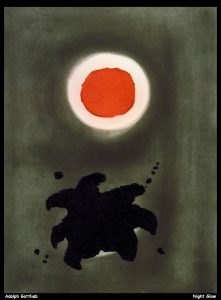Is This an Apocalypse? We Certainly Hope So—You Should Too
By Catherine Keller and John Thatamanil

The COVID-19 pandemic has many Christian communities wondering if the Apocalypse has finally arrived. We very much hope so.
No, we are not Christian fundamentalists praying to precipitate calamitous world-ending conflict and mass death in order to hasten Jesus’s return—a perverse vision by any standard (and not our idea of “end times fun!”). Despite its endless misreading for purposes of vengeful violence or end time fatalism, the metaphor of the apocalypse is back to stay. Even without the pandemic, climate change has reheated its relevance.
Therefore, we suspect that a moment’s attention to the actual ancient meaning of apocalypse may make for more responsible uses, secular or spiritual—as a warning, a wake-up call at the edge of time. Of our time.
Contemporaries keep using the term “apocalypse,” but literalist biblical interpretation notwithstanding, the term doesn’t mean what many think it means. Deriving from the Greek apokalypsis, the word means “unveiling” or “revelation.” Hence, the title given to the final book of the Christian Bible, “The Apocalypse of John,” is accurately translated “Revelation” not “Cataclysm.” Not “The End.” Unfortunately, this root meaning has been forgotten in popular circles.
When the term is understood as “unveiling,” we can then ask the right questions: What does this pandemic unveil? What have we refused to see about ourselves and the precarious world we’ve built, a world that now stands exposed and tottering in the harsh light of this unasked-for revelation? If we permit this crisis to expose the fissures of our failing world, this pandemic will have served as properly apocalyptic. If instead, despite its devastating toll, we return to an obsolete and unsustainable world, nothing meaningful will have been revealed.
As for the Book of Revelation, it too does not contain what popular depictions suggest. To begin with, credible biblical scholarship indicates that the author, John of Patmos, was not writing about the end of our world, but the end of his.
Writing as a member of a marginalized and persecuted religious community of Jesus followers at the end of the first century of the Common Era, John and his community witnessed the destruction of the city of Jerusalem, the fall of its hallowed temple, and the dispersion of its peoples, all instigated by Rome’s imperial brutality. Under such circumstances, writing openly and critically about Roman imperialism would have proved deadly for the author and his community. That is why John marshals a baroque and elusive symbolic repertoire for his audience—an audience who could easily decipher its dreamlike code.
If John was writing about his epoch, how are the particular symbols of the apocalypse relevant today, two millennia later.
John was not “predicting” this moment. Prophecy is not prediction of this or any closed future. Rather, prophecy is the poetic unveiling of underlying patterns—patterns of civilization so deep that they may replicate themselves indefinitely, until they bring on some climactic self-destruction. In John’s Revelation, destruction takes planetary form. So, for instance, upon the opening of the “seventh seal,” after “half an hour of silence” is held in heaven: “a third of the earth was burned up, and a third of the trees were burned up.” How can one not flash to the Amazon, then Australia, over the past few months?
Then, “a third of the living creatures in the sea died.” Are we there yet? What with current warming, acidification, plastic, dying coral reefs, threatened phytoplankton that produce half the world’s oxygen—ask an oceanographer.
No, John was not foreseeing climate change. He was dream-reading a tendency of human systems to bring down the nonhuman ones that support us. On the civilizational system, his code gets very pointed: the “666” tattooed on the head of the Beast signals in the ancient Hebrew gematria code “NeroCaesar,” encrypting the legacy of imperial violence.
On the back of this political power rides the “Whore of Babylon.” What system does she pornographically symbolize? All too literally clear: John lists 29 luxury products of Roman world trade from gold, wine, olive oil—to slaves. If the beast signifies imperialist politics, Babylon signifies not the consuming debauchery of neoliberal capitalism, but of its ancestor, the imperial global economy. He suddenly turns on her, devours her, bringing down the whole system. The “merchants weep” at global economic collapse.
No, John wasn’t predicting our present economic crisis; he was just dream-reading a deep contradiction at the heart of human civilization.
But at this moment, the apocalypse, flashing through the headlines, is about a systemic threat moving at much faster speed. At a gallop, you might say. In John’s narrative it is the fourth horseman of horror, the one riding the pale green horse, who brings “pestilence.” John was not predicting COVID-19. He was dream-reading world systems failure along with the plague, a familiar ancient catastrophe. That horse bears death by famine and wild animals. Its green pallor seems to embody the menace of the inhuman—viral, agricultural, animal.
So what might coronavirus “reveal” to us? Is it at once our inescapable interdependence with an earth-full of humans and nonhumans? Does that entanglement turn deadly when we repress it? When we think we can control, commodify and consume the matter of the world, does it bite back at our own mattering bodies?
In the vision, things don’t get better before they get worse. The collapse of the civilization built on systemic oppression and greed takes innumerable innocents—“including slaves”—down with it. Another figure of the nonhuman flies by: the eagle calling “in a loud voice, woe, woe, woe to the inhabitants of the earth” (Revelation 8:13). All of them. It is a cry of profound grief for all earthlings. Is it not audible now across every “social distance”?
Ancient warnings about ecological, economic, and political horrors will continue to haunt our present tense. But as we tense up against what is yet to come, there is a last prophetic glint from the text.
Cataclysm catalyzes radical change: it is figured as the city contrary to Rome/Babylon, a city gendered female, “the New Jerusalem.” In this city, contrary to the world of The Wall, the gates are open 24/7. The image is built of the ancient Hebrew hope, rigorously historical and material, of “the new heaven and earth.” In the biblical languages, “heaven” means not something supernatural but earth’s atmosphere as it extends into the mysterious darkness.
Perhaps, if we are able to awaken to what is unveiled in this apocalyptic moment, we will make our way forward into a new world rather than shore up the old one. John dream-read such a shift as sparklingly organic and diverse: the multiplicity of peoples, of nations, are renewed through the flow of clean water “free for all to drink”—and to wash their hands frequently!
And “the leaves of the trees are for the healing of the nations” (Revelation 22:2). If you’ve read Richard Powers’s novel The Overstory, the new arboreal botany, or the movement to plant billions of trees, the metaphor matters. Trees extract excess CO2 from the atmosphere and grant us breathing space and breathing time. Not that trees will “fix” climate change for us, or water heal pandemics.
Neither will the biblical God conduct a rescue operation; for such intervention, we shouldn’t hold our collective breath. Instead, some will seek to breathe in the Divine Spirit who may inspire us to find a way forward into a new world.
But what are the chances for a habitable and hospitably shared future? Close to none, if responsibility for the damage remains concealed. Which is why, even in the midst of flood, fire, or pandemic—a way, a wisdom, can get revealed. Apocalypse after all? May it be so!
#
This piece was first published in Religion & Ethics on 15 April 2020.
Catherine Keller is George T. Cobb Professor of Constructive Theology in The Graduate Division of Religion of Drew University. She teaches and lectures across a broad spectrum of pluralist, ecofeminist, process, and political theology. Books she has authored include From a Broken Web, Apocalypse Now & Then; God & Power; Face of the Deep; On the Mystery; Cloud of the Impossible; Political Theology of the Earth: Our Planetary Emergency and the Struggle for a New Public. She has just finished Apocalypse After All? Climate, Democracy and Other Last Chances. She has co-edited several volumes of the Drew Transdisciplinary Theological Colloquium, most recently Entangled Worlds: Religion, Science and the New Materialism.
John J. Thatamanil is Associate Professor of Theology and World Religions at Union Theological Seminary. He is the author of The Immanent Divine: God, Creation, and the Human Predicament and the forthcoming book, Circling the Elephant: Constructive Theology through Interreligious Learning. He teaches courses on comparative theology, theologies of religions as well as a course on Gandhi and King. He is a past-President of the North American Paul Tillich Society and the founding chair of the American Academy of Religion’s Theological Education Committee. His Op-Eds have appeared in the Washington Post, the Los Angeles Times and a variety of sites online.
Counterpoint blogs may be reprinted with the following acknowledgement: “This article was published by Counterpoint Navigating Knowledge on 6 May 2020.”
The views and opinions expressed on this website, in its publications, and in comments made in response to the site and publications are those of the author(s) and do not necessarily reflect the views and opinions of Counterpoint: Navigating Knowledge, its founders, its staff, or any agent or institution affiliated with it, nor those of the institution(s) with which the author is affiliated. Counterpoint exists to promote vigorous debate within and across knowledge systems and therefore publishes a wide variety of views and opinions in the interests of open conversation and dialogue.




3 Comments
The Great Pandemic Novel Will Not Be About the Pandemic – Counterpoint: Navigating Knowledge · May 27, 2020 at 4:27 AM
[…] few weeks ago, Counterpoint published a blog post on the COVID-19 “apocalypse.” Catherine Keller and John Thatamanil point out that the term […]
Immediacy and the End of Modernity’s Ends – Counterpoint: Navigating Knowledge · July 1, 2020 at 10:45 AM
[…] recent blog posts have touched on the meanings of end times and apocalypses. One in particular hoped for an apocalypse, in the sense of a new world being uncovered. I want to add to this discussion of the end times in […]
Political Counterpoint– for the Election and Beyond – Counterpoint: Navigating Knowledge · October 31, 2020 at 3:44 AM
[…] of who wins the U.S. presidency, the coronavirus will continue to ride the fourth horse of the apocalypse across our world. In its U.S. gallop, the virus inhibits social solidarities while exacerbating the […]